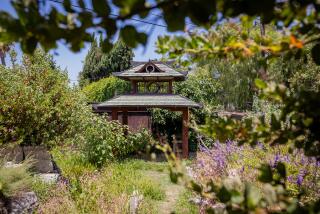Dreams Evaporate and Turn to Dust . . . : Orchards Fall but Houses Will Sprout
- Share via
From his hillside adobe home, David Galusha’s cool eyes drift out upon the land that was once his pride.
Twenty years, almost; then the bad-luck frost and the relentlessly increasing cost of water came and took it away.
It was Galusha’s decision to cut nearly 10,000 avocado trees into near kindling and sell off the Ramona farm piece by painful piece. But really, there was no other choice.
Giving up seared his soul the same way the frost burned his groves of tall trees. Now, the 53-year-old man with the lingering Oklahoma twang offers a droll joke, sort of, about the prospect of ever farming again.
“One of the other growers expressed it this way,” Galusha begins. “We belong to Avocados Anonymous--any time you feel like planting a tree, we’ll come drink with you ‘till the mood passes.” He smiles, just a little.
Back in 1972, it was all hope and promise.
Galusha and his brothers started growing avocado trees on their nearly 100 acres. That mightily pleased Galusha, who would carry on the family’s farming legacy and let his spirit savor a gentle stewardship.
It would be, he recalls, “a long-term, enjoyable lifestyle. Just a caretaker of the earth.”
Water, lifeblood of the insatiable avocado trees, cost a mere $65 per acre-foot then--a local farmer’s version of the nostalgic 35-cent milkshake--and the green tropical fruit often fetched a fat price at market.
The years, good and bad, passed beneath a big, hazy sky where single blackbirds soar and call out in piercing, lonely sounds.
Then visited 1989, dark and unforgettable.
The freeze settled in twice that year, killing some trees, damaging many others and leaving Galusha with the worst economic reckoning a farmer can face. The groves were mostly salvageable, he knew, but it would take a long time of heavy watering to revive them.
“It would have been starting out all over again. It would have taken two, three years to get another crop,” Galusha says.
It had taken up to three acre-feet of water per acre per year to keep the 100 acres growing. The water bill was $10,000 a month in the summertime--about $1 a month for each tree.
Galusha knew he had to let go.
“We were hit so hard, it wasn’t economically feasible to bring them back,” he says.
So the brothers cleared the trees, and are selling off the parcels that bore food and a livelihood for so long.
“We cut the trees into firewood and gave it to the Boy Scouts,” he says. Eight parcels have been sold, and two others are on the market. Spacious luxury houses will probably be built on the parcels.
The devastating end to farming was wrenching to Galusha and his wife, Mary.
“We went through a pretty good depression,” he says.
Galusha strikes a stranger as a kind and serious man, perhaps one who doesn’t easily bend or accept fate, not after he tried so hard and “did everything by the book.”
But the Mickey Mouse watch on his wrist is a flagrant giveaway to another side of his character, and Galusha’s dry humor seems to help vent the sorrow and disappointment from his body like harmless smoke.
When he ponders his own troubles, he recalls his family’s struggle through the Great Depression, and laconically remarks, “It’s kind of exciting to remember what that opportunity was like.”
Even so, Galusha seeks no cloying sympathy, making it clear he knew farming was a risk.
“You can’t feel sorry for me,” he says. “Everything has worked out. Our theory from the beginning was, if farming doesn’t work out, we’ll sell the land.”
He’s keeping the 11 acres containing his high-perched home, with its wide picture window that looks out on a panorama of farmland that’s slowly changing into homes.
And, though the worst is over, there’s one more unhappy task.
About 200 surviving avocado trees stand on Galusha’s homestead, and the cost of water has risen again, reaching $650 per acre-foot. These trees must go.
“I can’t afford to water them,” Galusha says.
He walks along the steep hillside to show a visitor a long-dead tree, now bony and brittle. Tess, the golden-haired farm dog, bounds along, and, when Galusha stops, she promptly finds the only shade around and flops in a semicircle under a bush, looking like a huge, heavy-breathing croissant.
Galusha has been several things in his life. A Navy officer, a probation worker and a teacher in a continuation school.
Farming seems to run richest in his blood, and, despite what he said about Avocados Anonymous and the rest, when pressed about whether he’ll try again, Galusha smiles mysteriously and says, “Well, you know, I’ve been thinking . . . “






